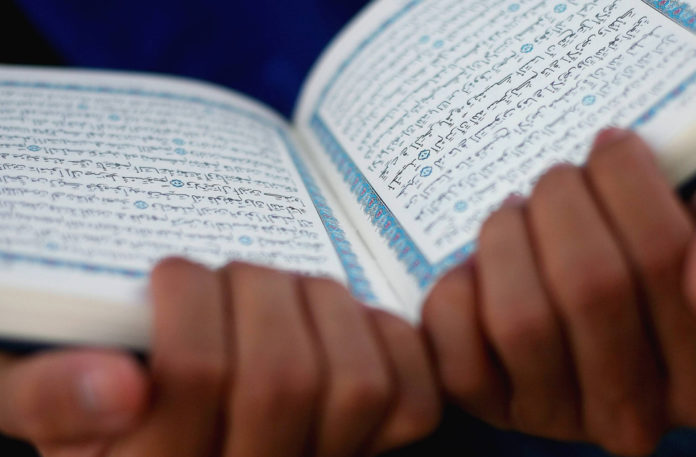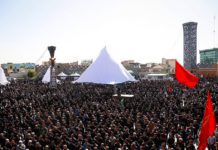The mannerisms of fasting
They are six:
1. Restraining the tongue and limbs from all that opposes the Divine Law (Sharî’ah).
He (sallAllâhu ‘alayhi wa sallam) saying,
| “whoever does not leave false speech and acting upon it, Allâh has no need of his leaving food and drink.” [Bukhârî] |
He (sallAllâhu ‘alayhi wa sallam) also said,
| “it is possible that one standing [in prayer] only attain weariness from his standing and the one fasting only attain hunger and thirst from his fasting.”
[Ahmad, al-‘Irâqî said the isnâd was hasan.] |
2. If one is invited to eat while he is fasting, let him say, ‘I am fasting’
The Messenger of Allâh (sallAllâhu ‘alayhi wa sallam) said,
| “if one of you is invited to eat while fasting, let him say, ‘I am fasting’ “
[Muslim] |
3. What should be said when one breaks the fast.
He (sallAllâhu ‘alayhi wa sallam) used to say upon breaking fast,
| “the thirst has gone, the veins are moistened and the reward is certain if Allâh wills.”
[Abû Dâwûd and ad-Dâruqutnî said its isnâd was hasan].
|
It is also reported that he said,
| “O Allâh! It is for you that I have fasted, and it is with your provision that I have broken fast.”
[Abû Dâwûd with a weak isnâd, however A. al-Arna’ut, Jami’ al-Usul, said that it has witnesses that strengthen it.] |
In another hadîth, it is reported that he said,
| “all praise and thanks are due to Allâh who gave me the strength to fast and who gave me the provisions with which to break fast.”
[al-Bayhaqî with a weak isnâd but it has witnesses that strengthen it.] |
4. What the fast should be broken with.
The fast should be broken with fresh dates, or slightly older, drier, dates, or water. It is reported that he ( sallAllâhu ‘alayhi wa sallam) would break fast with
| “fresh dates before praying; and if not then with older, drier, dates; and if not with dates then with some mouthfuls of water.”
[Abû Dawûd with a hasan isnâd] |
He (sallAllâhu ‘alayhi wa sallam) said,
| “if one of you is fasting then let him break fast with dates, if he does not find any then with water for it is pure and purifying.”
[Abû Dâwûd with a sahîh isnâd] |
5, 6. Hastening the iftâr (breaking of fast) and delaying the suhûr (pre-dawn meal)
The Messenger of Allâh (sallAllâhu ‘alayhi wa sallam) said,
| “take the meal of suhûr for indeed in the suhûr lies blessings.”
[Bukhârî and Muslim] |
He (sallAllâhu ‘alayhi wa sallam) said,
| “the people will not cease to be upon good so long as they hasten in breaking the fast.”
[Bukhârî and Muslim] |
He (sallAllâhu ‘alayhi wa sallam) said,
| “Allâh, Mighty and Magnificent, says, ‘the most beloved of My servants are those who are quickest in breaking fast.’ “
[Ahmad with a weak isnâd but it has witnesses that strengthen in, Jami’ al-Usûl] |
He (sallAllâhu ‘alayhi wa sallam) said,
| “this religion will remain good and pure so long as the people hasten in breaking the fast for the Jews and Christians would delay it.”
[Abû Dâwûd with a sahîh isnâd] |
‘Amr bin Maymûn said,
| ‘the Companions of the Messenger of Allâh (sallAllâhu ‘alayhi wa sallam) would be the quickest of people in breaking the fast and the slowest of them in taking the pre-dawn meal.’
[al-Bayhaqî] |
The suhûr is delayed so as to strengthen one more while he is fasting so that he can perform more actions of obedience, the gap between the Messenger of Allâh ( sallAllâhu ‘alayhi wa sallam) taking the suhûr and his prayer would be an interval allowing fifty verses of the Qur’ân to be recited.
[Bukhârî and Muslim]
The iftâr was hastened because it is possible that some physical harm arise from hunger and thirst, hence there is no need to put the soul through such difficulty in a time [after the time of breaking fast] in which hunger and thirst is no longer an action that would draw one closer to Allâh. One of the wealthier people amongst the Salaf was seen eating in the market place and when asked why he replied [by quoting the hadîth],
| ‘the delay of the rich is oppression.’
[Bukhârî and Muslim] |
What should be avoided while fasting
1. Continuous fasting.
Abû Hurayrah said,
| ‘the Messenger of Allâh (sallAllâhu ‘alayhi wa sallam) prohibited continuous fasting whereupon one of the Muslims asked him, “but you do it O Messenger of Allâh!” He replied, “who amongst you is like me? I spend the night with my Lord, He giving me food and drink.” But when the people persisted in fasting continuously, he fasted continuously with them for a day, followed by another until they saw the new moon upon which he said, “if the moon had delayed in appearing I would have made you fast more.” This was a punishment for them because they refused to stop continuously fasting.’
[Bukhârî and Muslim] |
Continuous fasting was prohibited because it weakens the person and emaciates his body by reason of something other than worship. As for the Messenger of Allâh (sallAllâhu ‘alayhi wa sallam) then if it is literally true that his food and drink was with his Lord, he cannot be said to have fasted continuously; but if ‘food and drink’ is a phrase used to denote the strength of his closeness and communion ( uns) with his Lord and the joy he felt at this closeness, then this takes the place of food and drink in revitalizing his strength, indeed this uns is better than food and drink in this respect,
And the Day that I meet you will be its breaking
For surely I find the delight of fasting for You within my soul
And not in the satisfaction of eating or drinking
2. Kissing
‘Â’ishah (radiyAllâhu ‘anhâ) said,
| ‘The Messenger of Allâh (sallAllâhu ‘alayhi wa sallam) would kiss and embrace while fasting but he was more able than you in restraining his desires.’
[Bukhârî and Muslim] |
Therefore whoever is old, able to control his desires and hence not ruin his fast, there is no harm in his kissing. If one is young and not sure that he can control his desires, it is disliked for him to kiss due to his subjecting his action of worship to the danger of something that could break it.
3. Cupping
It is authentically reported that the Messenger of Allâh (sallAllâhu ‘alayhi wa sallam) was cupped while fasting. [Bukhârî]
Anas was asked,
| ‘did you consider cupping to be disliked for the one fasting?’ He replied, ‘no, [we only considered it disliked] if it caused weakness.’
[Bukhârî] |
Hence whoever is physically weakened by cupping, it is disliked for him to do so, because in his weakened state he is more likely to break fast or find the action of fasting extremely difficult for him and hence become averse to it.
4. Applying Kohl.
Anas would apply Kohl while fasting. [Abû Dâwûd and ibn Hajr said the isnâd had no fault.]
|
al-A’mash said,
| ‘I never saw any of our companions disliking the application of Kohl for the one fasting.’ Ibrâhîm [an-Nakha’î] would allow the one fasting to apply aloes to his eyes.
[Abû Dâwûd] |
Having said this, it is safer not to apply it so as to steer clear of the difference that the scholars have concerning this issue.
5. Snuffing the nose during ablution
The Messenger of Allâh (sallAllâhu ‘alayhi wa sallam) said to Laqît bin Sabrah,
| “perform the ablution well, wipe between the fingers and exert yourself in snuffing the nose, unless you are fasting.”
[Abû Dâwûd] |
So he prohibited from exertion when snuffing the nose while fasting, the reason for this is that through exertion one puts his fast to risk [because the water could reach the back of the throat].
Allâh knows best.






















